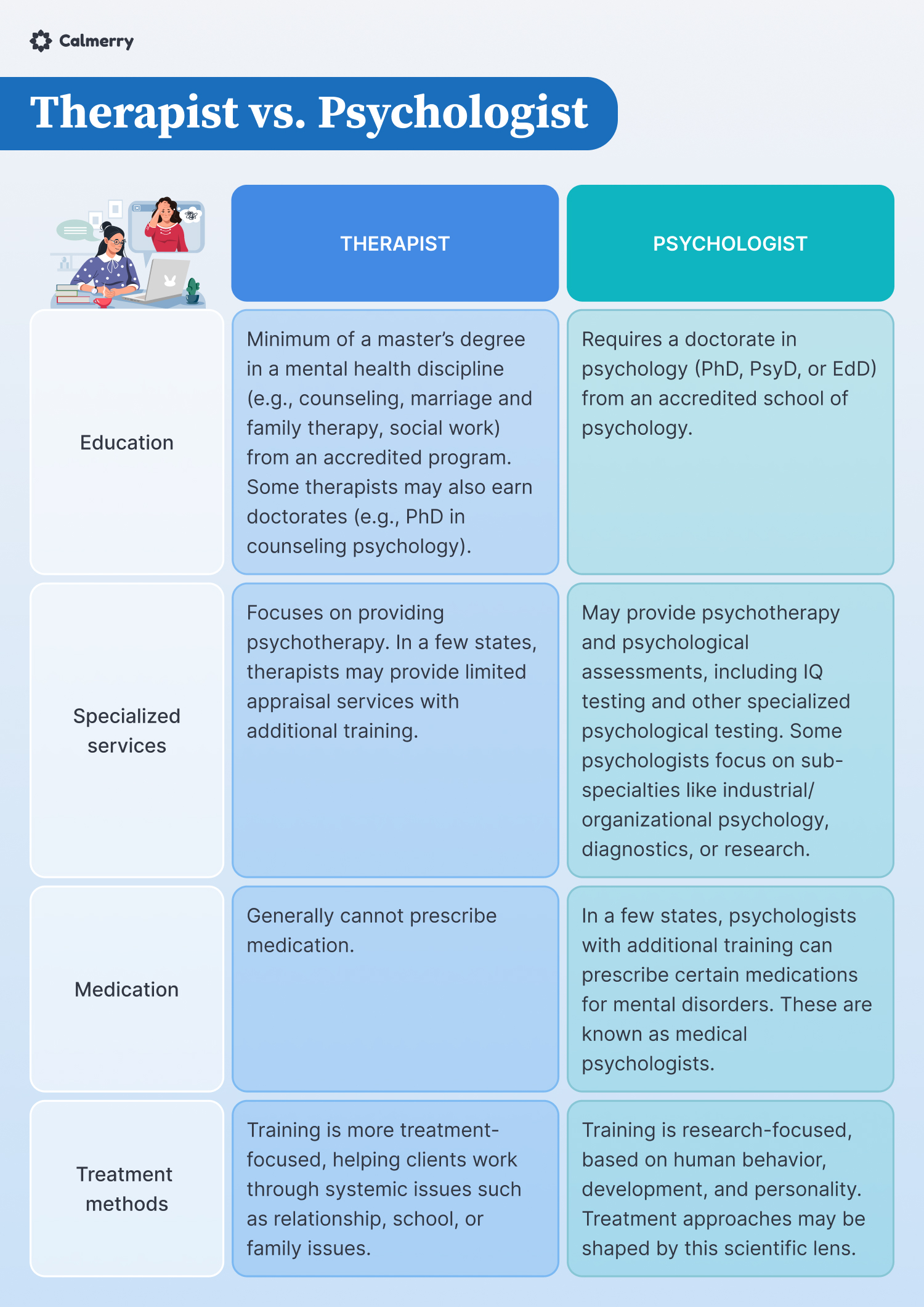Therapist vs. Psychologist: How to Choose the Best Fit for You

In this article
You’re ready to go to therapy. Maybe it’s your first time. Maybe you’re coming back to therapy and looking for a fresh approach.
A quick internet search for “therapists” will yield a variety of providers to choose from. You’ll see providers referred to as therapists or psychologists. You’ll also see these same providers sometimes referred to as psychotherapists, counselors, or social workers.
In fact, there are a number of different mental health professionals who practice therapy. These terms are often used interchangeably to refer to mental health professionals who occupy the same professional space. It might seem like they’re really all the same and all provide some type of therapy, just with different letters behind their names.
What’s the difference between a therapist and a psychologist? Most importantly, how do you choose the one that’s right for you?
The choices for mental health professionals can feel complicated and confusing. Here, we will break it all down and take a closer look at the similarities and what makes each type of provider unique.
A word about terminology
With so many different types of mental health professionals who refer to themselves as therapists, you might think that they are essentially all the same. After all, on the surface, they all seem to be referring to the same thing – someone who is trained and licensed to provide therapy. And, on the surface, you would be correct.
However, when you take a closer look, there are distinct differences between therapists and psychologists. As with most helping professions, some providers are trained and licensed to provide specialized services that others may not be able to.
Education and training may differ as well. Even then, there is a considerable amount of overlap. Also, keep in mind that every state has its own training and licensing requirements for therapists and psychologists.
The takeaway here is that different does not imply better. It simply means that there are different training and skill sets, different modalities, and different approaches to providing care.

Is a psychologist a therapist?
The short answer is yes. The longer answer is more multifaceted. All psychologists are therapists, but not all therapists are psychologists.
Who is a therapist?
The term therapist does not refer to a single type of mental health professional. It is actually a broad term used to describe any one of several types of mental health professionals who are trained in and practice one or more types of therapy to treat mental or physical disorders or conditions.
In the context of mental health, they are often referred to as psychotherapists.
Therapists can be trained in any one of several mental health disciplines, including counseling, social work, marriage and family therapy, psychology, and more.
In addition to providing therapy services, some therapists may also engage in consulting or teaching. A minimum of a master’s degree and professional licensure is required to practice as a therapist.
Who is a psychologist?
A psychologist, as defined by the American Psychological Association (APA), is “an individual who is professionally trained in one or more branches or subfields of psychology. Training is obtained at a university or a school of professional psychology, leading to a doctoral degree in philosophy (PhD), psychology (PsyD), or education (EdD).”
In addition to therapy, they may provide services that include educational testing, psychological testing and assessment, research, teaching, and business and organizational consulting.
Professional licensure is required to practice independently as a psychologist.
Similarities between a psychotherapist and a psychologist
If you’re getting the sense that psychologist vs therapist isn’t cut and dried, you’re right. While they are not the same, there are important similarities between the two:
Education and training
Both psychologists and psychotherapists hold graduate degrees in their respective mental health fields. They are required to complete extensive postgraduate training and pass examinations as part of their path to licensure.
Licensure
Both psychologists and psychotherapists are required to be licensed. Psychologists are licensed specifically as psychologists by a state board, having passed the required education, training, and examinations.
Therapists are also licensed by their respective state boards, having passed the required education, training, and examinations.
Training
Both psychologists and psychotherapists have extensive training in mental processes and can diagnose mental health disorders. Both are also trained in a number of effective treatment modalities and see people with many different types of mental health issues and needs.
Therapeutic services
Both psychologists and psychotherapists can help you address your mental health needs, learn healthy ways of coping, and improve your sense of well-being.
Both rely heavily on talk therapy as part of their practice of therapy and often use similar therapeutic approaches such as cognitive behavioral therapy.
Privacy and confidentiality
Concerns for privacy is one of the biggest worries people have when coming to therapy. Whether you choose a psychologist or psychotherapist, you can rest assured that your privacy is protected.
Both psychologists and psychotherapists of all disciplines are subject to all laws surrounding your privacy and confidentiality. They are also bound by both the regulations of their licensing boards and their respective codes of ethics and professional standards.
So far, psychologists and psychotherapists may sound pretty similar. So, what’s the difference?
Differences between a therapist and a psychologist
While they do share some similarities, there are important differences to be aware of:
Education
A psychologist is required to hold a doctorate in psychology (usually a PhD, PsyD, or EdD) from an accredited school of psychology to be eligible for licensure.
To be eligible for licensure, a therapist must hold a minimum of a master’s degree in a mental health discipline (e.g., counseling, marriage and family therapy, social work) from an accredited program.
Many therapists go on to earn doctorates in their respective disciplines (e.g., PhD in counseling psychology or counselor education, DSW, Doctor of Social Work).
Specialized services
Not all psychologists provide psychotherapy as part of their practice. Some may focus their work on other sub-specialties like industrial/organizational psychology, diagnostics, or research.
One of the specialized services that sets psychologists and psychotherapists apart is testing and assessment. Psychologists are extensively trained in testing and assessment as part of their education and training.
A psychologist may provide both therapy and various psychological assessment services. These services might include educational or psychological testing and assessment (ex., IQ testing).
Psychological testing is generally not considered to be in a therapist’s scope of practice. However, a few states allow therapists to provide some limited appraisal services but require additional training and approval to do so.
It’s important to note here that therapists of all kinds often use various screening tools or general assessments. These tools should not be mistaken for instruments used for psychological testing which require significant training and proficiency for use.
– Dr. Dawn Ferrara, PsyD, Licensed Professional Counselor (LPC), and mental health writer
Medication
One question people often have is whether therapists can prescribe medication. In general, the answer is no.
However, in a few states, psychologists are allowed to prescribe certain medications used to treat mental disorders. These psychologists, sometimes referred to as medical psychologists, have completed additional training and approval to provide that service.
Treatment methods
According to the APA, a psychologist’s training and educational foundations are research-focused and based on human behavior and development, and personality. As a result, their treatment approaches may be shaped more by that scientific lens.
Training for therapists tends to be more treatment-focused. They may bring stronger theoretical foundations to their approach to care, helping their clients work through systemic issues such as relationship, school, or family issues.
With the similarities and differences, how do you know which type of therapist is right for you?
Should I see a therapist or psychologist?
A lot goes into deciding who to see when you’re seeking help.
On one hand, psychologists may provide services a therapist may not be able to. On the other hand, a therapist may be experienced in the exact type of issue you’re facing.
So how can you decide?
Identify why you’re seeking help
The first thing to think about is the issue that’s bringing you to therapy. While you may not know exactly why you’re experiencing the things you are, you probably have a good idea of what you’re feeling and the issues you’re dealing with. Make a list of the issues that you’re finding most bothersome.
If you’re dealing with anxiety or stress, having relationship issues, or just trying to figure it all out, a therapist might be the right fit.
If you’re dealing with more complex issues, chronic mental illness, or struggling with cognitive or learning issues, a psychologist might be a better fit.
Finding a therapist
The internet has made finding a therapist easier than ever. In fact, about 80% of people report that they have searched for mental health help online. Most therapists have an online presence either via their own websites or any number of provider directories.
You can see their training and specialties as well as other information about their therapy practice.
There are also a number of online therapy platforms where you can access counseling when and where it works best for you. In fact, online counseling has become a widely accepted and effective way of accessing therapy. It’s cost-effective, convenient, and as effective as in-person counseling.
Another way to find therapists is to ask trusted friends and family, or even your personal healthcare provider. A positive recommendation can go a long way towards easing the worry about seeing someone.
Make a short list of therapists who seem like a good fit. Along with their training and expertise, what else might be important for you? Age? Gender? Something else? Think about factors that might influence your choice.
Pay attention to qualifications and experience
As we’ve already mentioned, there is considerable overlap across mental health disciplines, so you want to consider the provider’s training and specialties. Do they have the training and experience you need to effectively address the issues?
For example, a particular psychologist may see individuals but not families, and you need family work.
Likewise, a therapist your friends rave about has a PhD, lots of experience but doesn’t do the psychological testing that has been recommended for your child.
Take the time to learn about any provider you’re considering. What is their education and licensing background? What are their specialty areas? This information can give you a better understanding of their expertise.
Therapeutic approach
As you’ve searched for providers, you’ve probably run across more approaches to therapy than you knew existed. Treating mental health is not a one-size-fits-all. Rather, there are a number of theoretical orientations and approaches to treatment.
Every therapist has their own preferences and approach to care.
Some of the more common approaches and types of therapy include:
- Person-centered therapy
- Cognitive behavioral therapy (CBT)
- Acceptance and commitment therapy (ACT)
- Psychodynamic or psychoanalytical therapy
- Family systems-based therapy
These are just a handful of the many types of therapy and ways of working with clients. (Just a note – most psychotherapists refer to the people they treat as clients, but some use the term patient.)
Learning about a psychotherapist’s particular areas of expertise and how they work with their clients can help you decide if they offer what you need.
Find the right match
Therapy with a mental health provider, whether a psychologist or a therapist, has been shown to be helpful for many people. How you connect with your therapist plays a huge role in how productive that relationship will be.
The therapist-client relationship, often called the therapeutic alliance, is one of the strongest factors in a positive therapeutic outcome. In fact, the relationship you have with your therapist and their mastery of therapeutic skills seems to matter more to outcomes than which method they use.
Is a psychologist or therapist better for depression?
Depression is a complex mental disorder. It can range from mild to severe. It is treatable and there are a number of treatment options, including psychotherapy, medication, and lifestyle management. Treating depression is highly individualized and requires a comprehensive approach.
Both psychotherapists and many psychologists can provide psychotherapy. Both are well-trained and able to diagnose and treat someone with depression using similar approaches and modalities.
However, the severity of the depression may influence the choice of provider. For example, depression related to a life adjustment, or a loss may be a good fit for a psychotherapist.
Psychotherapy may be enough to alleviate symptoms. Someone living with severe or treatment-resistant depression may need more intensive, targeted therapies and services (ex., psychological testing and assessment) that are generally found with a psychologist.
While therapy is the first-line treatment for depression, some people need medication to help manage their depression. When that happens, the services of a medical psychologist, psychiatrist or other prescribing mental health practitioner (i.e., psychiatric nurse practitioner or physician’s assistant) are required.
Whether a psychologist or a psychotherapist is the best fit for treating depression really comes down to the needs of the person and the clinician’s particular skills and expertise.
Not every psychotherapist or psychologist treats every disorder. That’s why it is so important to be honest about your symptoms and issues when considering a potential therapist and take your time to find the clinician that is the right fit for you.
– Dr. Dawn Ferrara, PsyD, Licensed Professional Counselor (LPC), and mental health writer
A word from Calmerry
With all the resources available today, choosing a therapist, whether in-person or online, is easier than ever. Now that you know the differences and similarities between therapists and psychologists, take your time.
Ask all the questions you need to and allow yourself to say yes to improved mental health. Whether you’re dealing with depression or another mental health issue, a well-trained mental health clinician can help you address those needs and find the path to healing and growth.
Your therapist will be there to guide and support you every step of the way.
At Calmerry, we have therapists from every discipline who are well-trained and ready to help. Our online program offers mental health services that can be accessed where and when it works best for you. And, from your initial contact, you can be seeing your therapist in as little as one business day.
Let us take the stress of finding a therapist out of the process. When you’re ready, Calmerry is here.
online therapy
live video session



